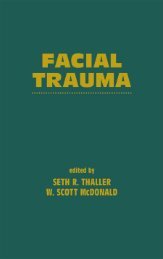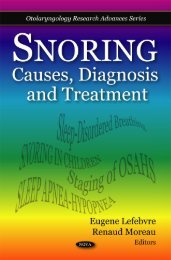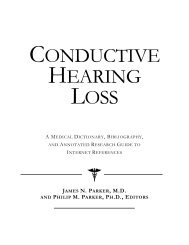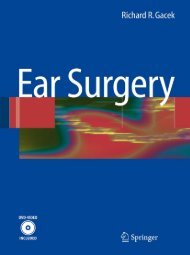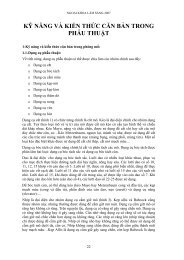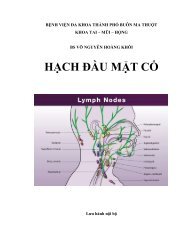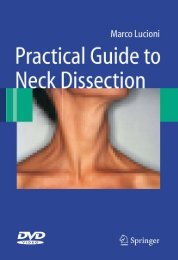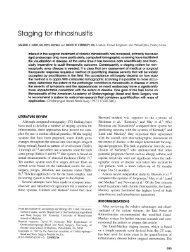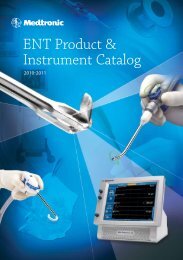- Page 2:
MEDICAL RADIOLOGYRadiation Oncology
- Page 6:
Jiade J. Lu, MD, MBAAssociate Profe
- Page 10:
PrefaceNasopharyngeal cancer is a u
- Page 14:
Contents1 The Epidemiology of Nasop
- Page 18:
The Epidemiology of Nasopharyngeal
- Page 22:
The Epidemiology of Nasopharyngeal
- Page 26:
The Epidemiology of Nasopharyngeal
- Page 30:
The Epidemiology of Nasopharyngeal
- Page 34:
10 M-S. Zeng and Y-X. Zengenvironme
- Page 38:
12 M-S. Zeng and Y-X. Zengmedicinal
- Page 42:
14 M-S. Zeng and Y-X. Zengloss and
- Page 46:
16 M-S. Zeng and Y-X. ZengNPC sampl
- Page 50:
18 M-S. Zeng and Y-X. Zengthe basal
- Page 54:
20 M-S. Zeng and Y-X. Zengmultistep
- Page 58:
22 M-S. Zeng and Y-X. ZengHui AB, L
- Page 62:
24 M-S. Zeng and Y-X. ZengSnudden D
- Page 66:
Molecular Signaling Pathways 3in Na
- Page 70:
Molecular Signaling Pathways in Nas
- Page 74:
Molecular Signaling Pathways in Nas
- Page 78:
Molecular Signaling Pathways in Nas
- Page 82:
Molecular Signaling Pathways in Nas
- Page 86:
Molecular Signaling Pathways in Nas
- Page 90:
Molecular Signaling Pathways in Nas
- Page 94:
Natural History, Presenting Symptom
- Page 98:
Natural History, Presenting Symptom
- Page 102:
Natural History, Presenting Symptom
- Page 106:
Natural History, Presenting Symptom
- Page 110:
Natural History, Presenting Symptom
- Page 114:
Natural History, Presenting Symptom
- Page 118:
54 P-J. Lou, W-L. Hsu, Y-C. Chien e
- Page 122:
56 P-J. Lou, W-L. Hsu, Y-C. Chien e
- Page 126:
58 P-J. Lou, W-L. Hsu, Y-C. Chien e
- Page 130:
60 P-J. Lou, W-L. Hsu, Y-C. Chien e
- Page 134:
62 P-J. Lou, W-L. Hsu, Y-C. Chien e
- Page 138:
64 P-J. Lou, W-L. Hsu, Y-C. Chien e
- Page 142:
66 K. S. Lohobviously surmise that
- Page 146:
68 K. S. LohTable 6.2. Causal assoc
- Page 152:
Pathology of Nasopharyngeal Carcino
- Page 156:
Pathology of Nasopharyngeal Carcino
- Page 160:
Pathology of Nasopharyngeal Carcino
- Page 164:
Pathology of Nasopharyngeal Carcino
- Page 168:
Pathology of Nasopharyngeal Carcino
- Page 172:
Imaging in the Diagnosis and Stagin
- Page 176:
Imaging in the Diagnosis and Stagin
- Page 180:
Imaging in the Diagnosis and Stagin
- Page 184:
Imaging in the Diagnosis and Stagin
- Page 188:
Imaging in the Diagnosis and Stagin
- Page 192:
Imaging in the Diagnosis and Stagin
- Page 196:
Imaging in the Diagnosis and Stagin
- Page 200:
96 J-C. Linon the outcome. The aim
- Page 204:
98 J-C. LinTable 9.1. Summary of pr
- Page 208:
100 J-C. LinTable 9.2. Summary of p
- Page 212:
102 J-C. Lintumor volume was found
- Page 216:
104 J-C. Lin(Neel et al. 1984a; Nee
- Page 220:
106 J-C. Linradiotherapy became hig
- Page 224:
108 J-C. Linsis. However, the false
- Page 228:
110 J-C. LinTable 9.5. Summary of p
- Page 232:
112 J-C. LinTable 9.6. Summary of o
- Page 236:
114 J-C. LinTable 9.7. Summary of t
- Page 240:
116 J-C. LinTable 9.8. Summary of p
- Page 244:
118 J-C. Lincontaining 59 NPC patie
- Page 248:
120 J-C. Linpatients of three nonke
- Page 252:
122 J-C. Linfactor for metastasis-f
- Page 256:
124 J-C. LinTable 9.9. Prognostic i
- Page 260:
126 J-C. LinTable 9.10. Prognostic
- Page 264:
128 J-C. Linthat it may trigger the
- Page 268:
130 J-C. LinChen Y, Liu MZ, Liang S
- Page 272:
132 J-C. LinHwang CF, Cho CL, Huang
- Page 276: 134 J-C. LinMa BB, Leung SF, Hui EP
- Page 280: 136 J-C. LinWang CC (1991) Improved
- Page 284: 138 R. Ove, R. R. Allison, and J. J
- Page 288: 140 R. Ove, R. R. Allison, and J. J
- Page 292: 142 R. Ove, R. R. Allison, and J. J
- Page 296: 144 R. Ove, R. R. Allison, and J. J
- Page 300: 146 R. Ove, R. R. Allison, and J. J
- Page 304: Drug Therapy for Nasopharyngeal Car
- Page 308: Drug Therapy for Nasopharyngeal Car
- Page 312: Drug Therapy for Nasopharyngeal Car
- Page 316: Drug Therapy for Nasopharyngeal Car
- Page 320: Drug Therapy for Nasopharyngeal Car
- Page 324: Drug Therapy for Nasopharyngeal Car
- Page 330: 162 J. S. Cooperdegree the failure
- Page 334: 164 J. S. Cooperresources of the RT
- Page 338: 166 J. S. CooperDimery IW, Peters L
- Page 342: 168 J. Weemorbidity such as reduced
- Page 346: 170 J. Weethey also took the opport
- Page 350: 172 J. Weedisease-free survival rat
- Page 354: 174 J. WeeTable 13.1. Randomized tr
- Page 358: 176 J. Weesignificant improvements
- Page 362: 178 J. WeeReferencesAdelstein DJ, S
- Page 366: 180 J. Weenasopharyngeal carcinoma.
- Page 370: Neoadjuvant Chemotherapy: Trials 14
- Page 374: Neoadjuvant Chemotherapy: Trials an
- Page 378:
Neoadjuvant Chemotherapy: Trials an
- Page 382:
Neoadjuvant Chemotherapy: Trials an
- Page 386:
Neoadjuvant Chemotherapy: Trials an
- Page 390:
Adjuvant Chemotherapy for Nasophary
- Page 394:
Adjuvant Chemotherapy for Nasophary
- Page 398:
Advances in the Technology of Radia
- Page 402:
Advances in the Technology of Radia
- Page 406:
Advances in the Technology of Radia
- Page 410:
Advances in the Technology of Radia
- Page 414:
Advances in the Technology of Radia
- Page 418:
Advances in the Technology of Radia
- Page 422:
Advances in the Technology of Radia
- Page 426:
Advances in the Technology of Radia
- Page 430:
214 J. J. Lu, V. Grégoire, and S.
- Page 434:
216 J. J. Lu, V. Grégoire, and S.
- Page 438:
218 J. J. Lu, V. Grégoire, and S.
- Page 442:
220 J. J. Lu, V. Grégoire, and S.
- Page 446:
222 J. J. Lu, V. Grégoire, and S.
- Page 450:
224 J. J. Lu, V. Grégoire, and S.
- Page 454:
226 J. J. Lu, V. Grégoire, and S.
- Page 458:
228 J. J. Lu, V. Grégoire, and S.
- Page 462:
230 J. J. Lu, V. Grégoire, and S.
- Page 466:
232 J. J. Lu, V. Grégoire, and S.
- Page 470:
234 I. W. K. Tham and J. J. LuTable
- Page 474:
236 I. W. K. Tham and J. J. Lu17% a
- Page 478:
238 I. W. K. Tham and J. J. Lucompl
- Page 482:
240 I. W. K. Tham and J. J. LuGan Y
- Page 486:
242 D. Chua19.2Prognostic FactorsIm
- Page 490:
244 D. Chuaglass. A plain X-ray of
- Page 494:
246 D. ChuaTable 19.3. Results in l
- Page 498:
248 D. Chuawas superior to nine-fie
- Page 502:
250 D. ChuaChua DT, Sham JS, Kwong
- Page 506:
Surgery for Recurrent Nasopharyngea
- Page 510:
Surgery for Recurrent Nasopharyngea
- Page 514:
Surgery for Recurrent Nasopharyngea
- Page 518:
Surgery for Recurrent Nasopharyngea
- Page 522:
Surgery for Recurrent Nasopharyngea
- Page 526:
Surgery for Recurrent Nasopharyngea
- Page 530:
Surgery for Recurrent Nasopharyngea
- Page 534:
268 Y. Guo and B. S. Glissonpalliat
- Page 538:
270 Y. Guo and B. S. Glissonresulti
- Page 542:
272 Y. Guo and B. S. Glisson11.4 mo
- Page 546:
274 Y. Guo and B. S. GlissonHasbini
- Page 550:
276 S. S. Lo, J. J. Lu, and L. Kong
- Page 554:
278 S. S. Lo, J. J. Lu, and L. Kong
- Page 558:
280 S. S. Lo, J. J. Lu, and L. Kong
- Page 562:
282 S. S. Lo, J. J. Lu, and L. Kong
- Page 566:
284 S. S. Lo, J. J. Lu, and L. Kong
- Page 570:
286 S. S. Lo, J. J. Lu, and L. Kong
- Page 574:
288 S. S. Lo, J. J. Lu, and L. Kong
- Page 578:
290 S. S. Lo, J. J. Lu, and L. Kong
- Page 582:
292 S. S. Lo, J. J. Lu, and L. Kong
- Page 586:
294 S. S. Lo, J. J. Lu, and L. Kong
- Page 590:
296 E. Ozyar and I. Ayanmetastasis,
- Page 594:
298 E. Ozyar and I. Ayanmens (Lomba
- Page 598:
300 E. Ozyar and I. Ayanchemotherap
- Page 602:
302 E. Ozyar and I. AyanTable 23.1.
- Page 606:
304 E. Ozyar and I. Ayanand 127 (96
- Page 610:
306 E. Ozyar and I. Ayan(Hodgkin’
- Page 614:
308 E. Ozyar and I. AyanChildren’
- Page 618:
310 B. O’Sullivan and E. Yuthe ra
- Page 622:
312 B. O’Sullivan and E. Yuin the
- Page 626:
314 B. O’Sullivan and E. YuTable
- Page 630:
316 B. O’Sullivan and E. YuFig. 2
- Page 634:
318 B. O’Sullivan and E. Yudefine
- Page 638:
320 B. O’Sullivan and E. YuFig. 2
- Page 642:
322 B. O’Sullivan and E. YuLee CC
- Page 646:
324 Subject Index- - hand-foot synd
- Page 650:
326 Subject IndexInverse planning (
- Page 654:
328 Subject IndexRadiosensitizer, 1
- Page 658:
List of ContributorsRon R. Allison,
- Page 662:
List of Contributors 333Shaojun Lin
- Page 666:
Medical RadiologyDiagnostic Imaging
- Page 670:
Medical RadiologyDiagnostic Imaging



